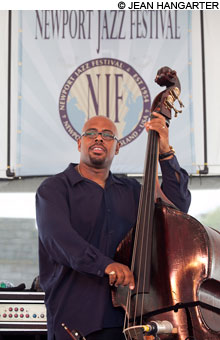
SWING THAT MUSIC! Christian McBride's Inside Straight band were on fire.
|
Every year the Newport Jazz Festival confronts with the same dilemma: how to objectively judge music presented under such variable conditions. There are three stages out on the peninsula of Fort Adams State Park: the big Fort Stage looks out onto the vista of Narragansett Bay and the expanse of the Newport Bridge; the Quad Stage at center field within the fort's walls; and the Harbor Stage along the outer wall. Small, open tents offer shelter for a couple of hundred people each at the Harbor and Quad stages, but the Fort crowd has to deal with the sun (or rain) as best they can.
>> SLIDESHOW: Newport Jazz Festival 2012 <<
But here's the thing: which music at the festival is going to hold you, and how, especially when the air temperature is about 80 but feels a lot hotter because of humidity and lack of breeze? On Saturday, percussionist Pedrito Martinez was killing it in the Quad tent with Afro-Cuban dance rhythms, call-and-response vocals, piano, bass, drums, and percussion. Out front at the Fort was saxophonist John Ellis's all-instrumental Doublewide, with the leader's saxophone, plus trombone, sousaphone, drums, and keyboards. This stuff should have worked: a smart post-bop blend of New Orleans second-line rhythms, norteño two-steps, and songs with titles like "Three Legged Tango in Jackson Square." What was not to like? Everything was "interesting," including keyboardist Gary Versace switching off from organ to accordion, and Alan Ferber's nicely detailed muted trombone solo. But the shadeless heat was punishing, and every solo seemed to last half a chorus too long.
What, then, made Christian McBride's Inside Straight band "better"? Out at the Harbor stage, the air hung motionless and the tent overflowed with standees. Were the solos really that much cooler? Maybe it was the chord movement of the tunes behind those soloists, the shifting rhythmic patterns from McBride and drummer Ulysses Owens Jr. The cycle of soloists never wore out its welcome — alto saxophonist Steve Wilson, vibraphonist Warren Wolf, pianist Christian Sands, not to mention McBride's own pizzicato solos, whose springy lines flow with organic logic.
Would this band have sounded this good on the Fort Stage? I think yes, even though by any measure this wasn't "groove" or dance music — not Pedrito. In fact, one of the highlights was a straightahead eighth-note swing number with fast "walking" bass. But Wolfe, like everyone else in the band, was on fire. He shaped his strings of eighth-note phrases with syncopated interruptions, and when, at one point, he came speeding out of the chorus and into the turnaround, a "whoa!" rose from the crowd. A musician could probably analyze and dismiss Wolfe's feat as some little "trick" of suspension and resolution. ("Oh, yeah, people always lose their shit when you do that.") But I think not. There was nothing gimmicky in this otherwise very familiar, "demanding" music. Just very hard, savvy jazz swing.